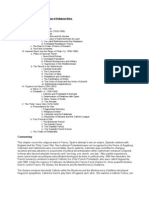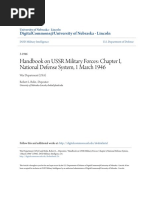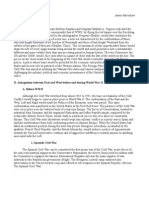Battle of Waterloo
Battle of Waterloo
Uploaded by
api-242293933Copyright:
Available Formats
Battle of Waterloo
Battle of Waterloo
Uploaded by
api-242293933Original Title
Copyright
Available Formats
Share this document
Did you find this document useful?
Is this content inappropriate?
Copyright:
Available Formats
Battle of Waterloo
Battle of Waterloo
Uploaded by
api-242293933Copyright:
Available Formats
Carl Hencey French 111 French History The Battle of Waterloo On June 18th, 1815, Napoleon Bonaparte led
the French forces into one of the fiercest battles in history. Nearly 80,000 French soldiers were up against over 67,000 allied troops on a plain in the United Kingdom of the Netherlands, just a few miles south of Brussels. Due to Napoleons recent escape from Elba and reclamation of his title of Emperor of France, many of the nations that stopped his previous escapades came running to remove him from power once again. Britain, Austria, Prussia, and Russia all played major roles in the opposition of France in the Battle of Waterloo. Napoleons grand scheme was to defeat the massed allied force at Brussels, thus giving him access to nearly all of Europe. His strategy was to divide and conquer the allied forces as individual countries. To do this, he sent many of his troops on June 15th to attack the Dutch army, which was separated from its allied partners. Unfortunately for the French, reinforcements were able to arrive in time and beat back the French troops. A stalemate would continue until the morning of the 18th, when the full scale Battle of Waterloo took place. Wellington, the leader of the allied forces, used sneaky tactics to deceive Napoleons generals. Initially, he hid the majority of his forces out of sight just over a ridge. When they were most needed, those troops would play a key role in preventing Napoleons reinforcements from reaching their destination, effectively isolating an entire French flank. Later in the battle, Wellington made it appear as though he was retreating, which resulting in Napoleon sending the majority of his cavalry
charging after them. Instead of finding the retreating troops, the French cavalry ran headlong into an ambush. Both of these tactics were extremely successful and resulted in many French casualties. By the end of the day, the French were in full-fledged retreat. Although he entered the battle with many more troops than his opponents, Napoleons army was poorly trained and lacked leadership from its generals. Instead of trained troops, Napoleon had haphazardly thrown together a group of misfits, including peasants and war veterans. As a result, he was beaten badly by his opponents. The defeat of the French at the Battle of Waterloo was the last time Napoleon would lead his nation. He would be returned to exile in St Helena shortly after his defeat and capture. Although the Battle of Waterloo is not typically seen in a positive light in French culture, it certainly brought about several changes that benefitted the common man in France. The defeat at Waterloo marked the end of the French Empire, and at long last, an end to the Napoleonic Wars. Slowly, France would develop into a democracy, where the opinions and needs of all could be heard. Equality came into much more focus after Napoleons long reign of dominance was snapped. The end of Napoleons reign marked the start of a new French era, which included several developments that would move France forward into the 20th century and beyond.
Sources 1. http://www.britishbattles.com/waterloo/waterloo-june-1815.htm 2. http://www.bbc.co.uk/history/british/empire_seapower/battle_waterloo_01.shtml
You might also like
- Assess The View That The Main Reason For The Defeat of Napoleon at Waterloo in 1815 Was Wellington's LeadershipNo ratings yetAssess The View That The Main Reason For The Defeat of Napoleon at Waterloo in 1815 Was Wellington's Leadership7 pages
- The Energy Non-Crisis - Lindsey Williams PDFNo ratings yetThe Energy Non-Crisis - Lindsey Williams PDF5 pages
- Twelve Years’ Military Adventure in Three-Quarters of the Globe – Vol. IIFrom EverandTwelve Years’ Military Adventure in Three-Quarters of the Globe – Vol. IINo ratings yet
- A Ruinous and Unhappy War New England and The War of 1812 James H. EllisNo ratings yetA Ruinous and Unhappy War New England and The War of 1812 James H. Ellis327 pages
- The Eleventh Hour: How Great Britain, the Soviet Union, and the U.S. Brokered the Unlikely Deal that Won the WarFrom EverandThe Eleventh Hour: How Great Britain, the Soviet Union, and the U.S. Brokered the Unlikely Deal that Won the War4.5/5 (1)
- A History Of The British Army – Vol. IV – Part Two (1789-1801)From EverandA History Of The British Army – Vol. IV – Part Two (1789-1801)No ratings yet
- Notes on the Battle of Waterloo [Illustrated Edition]From EverandNotes on the Battle of Waterloo [Illustrated Edition]No ratings yet
- Chamberlain - A Business History of The United States (1991)100% (1)Chamberlain - A Business History of The United States (1991)307 pages
- Personal Recollections of the War of 1861 As Private, Sergeant and Lieutenant in the Sixty-First Regiment, New York Volunteer InfantryFrom EverandPersonal Recollections of the War of 1861 As Private, Sergeant and Lieutenant in the Sixty-First Regiment, New York Volunteer InfantryNo ratings yet
- Cornerstones of Courage: The Story of Ssgt. William J. Bordelon, UsmcFrom EverandCornerstones of Courage: The Story of Ssgt. William J. Bordelon, UsmcNo ratings yet
- The Invasion of the Crimea: Vol. IX [Sixth Edition]: Its Origin, and an Account of its Progress Down to the Death of Lord RaglanFrom EverandThe Invasion of the Crimea: Vol. IX [Sixth Edition]: Its Origin, and an Account of its Progress Down to the Death of Lord RaglanNo ratings yet
- The Limits of Naval Power British Gunboat Diplomacy in China From The Nemesis To The Amethyst 1839 1949No ratings yetThe Limits of Naval Power British Gunboat Diplomacy in China From The Nemesis To The Amethyst 1839 194929 pages
- Admiral of the Blue: The Life and Times of Admiral John Child Purvis (1747–1825)From EverandAdmiral of the Blue: The Life and Times of Admiral John Child Purvis (1747–1825)No ratings yet
- The War Of The American Revolution: Narrative, Chronology, And Bibliography [Illustrated Edition]From EverandThe War Of The American Revolution: Narrative, Chronology, And Bibliography [Illustrated Edition]No ratings yet
- To End All Wars by Adam Hochschild (Excerpt)100% (2)To End All Wars by Adam Hochschild (Excerpt)18 pages
- John Vincent "Jack" Power: Outside City Hall in Worcester, Massachusetts, Stands A Statue of A Smiling MarineNo ratings yetJohn Vincent "Jack" Power: Outside City Hall in Worcester, Massachusetts, Stands A Statue of A Smiling Marine4 pages
- A Problem of Paganism Offprint - Marenbon PDF100% (1)A Problem of Paganism Offprint - Marenbon PDF35 pages
- When Hell Came to Sharpsburg: The Battle of Antietam and its Impact on the Civilians Who Called it HomeFrom EverandWhen Hell Came to Sharpsburg: The Battle of Antietam and its Impact on the Civilians Who Called it Home4/5 (1)
- Seven Years' Campaigning In The Peninsula And The Netherlands; From 1808 To 1815.—Vol. IIFrom EverandSeven Years' Campaigning In The Peninsula And The Netherlands; From 1808 To 1815.—Vol. II4.5/5 (1)
- Memoirs of a French Napoleonic Officer: Jean-Baptiste Barres, Chasseur of the Imperial GuardFrom EverandMemoirs of a French Napoleonic Officer: Jean-Baptiste Barres, Chasseur of the Imperial Guard3.5/5 (2)
- Female Warriors, Vol. II (of 2) Memorials of Female Valour and Heroism, from the Mythological Ages to the Present Era.From EverandFemale Warriors, Vol. II (of 2) Memorials of Female Valour and Heroism, from the Mythological Ages to the Present Era.No ratings yet
- Victory at Adowa!: Rastafari Online SpecialNo ratings yetVictory at Adowa!: Rastafari Online Special8 pages
- "Had All The Cavalry Been in The Front Not One Man Could Have Escaped " Hopperstown, New Jersey, 16 April 1780100% (1)"Had All The Cavalry Been in The Front Not One Man Could Have Escaped " Hopperstown, New Jersey, 16 April 178031 pages
- History of The U.S. Marine Corps in WWII Vol V - Victory and Occupation PCN 19000262800 - 50% (1)History of The U.S. Marine Corps in WWII Vol V - Victory and Occupation PCN 19000262800 - 5215 pages
- Thayer Philippines Grants U.S. Access To Four New Bases Under EDCANo ratings yetThayer Philippines Grants U.S. Access To Four New Bases Under EDCA2 pages
- The German Pionier: Case Study of The Combat Engineer's Employment During Sustained Ground CombatNo ratings yetThe German Pionier: Case Study of The Combat Engineer's Employment During Sustained Ground Combat58 pages
- Proxy Wars: Implications of Great-Power Rivalry For The Onset and Duration of Civil WarNo ratings yetProxy Wars: Implications of Great-Power Rivalry For The Onset and Duration of Civil War25 pages
- Rules of Play: Grossbeeren Katzbach Kulm DennewitzNo ratings yetRules of Play: Grossbeeren Katzbach Kulm Dennewitz42 pages
- Military Alliances in The Early Cold WarNo ratings yetMilitary Alliances in The Early Cold War19 pages
- The War That Must Never Be Fought: Ch. 4-6, Edited by George P. Shultz and James E. GoodbyNo ratings yetThe War That Must Never Be Fought: Ch. 4-6, Edited by George P. Shultz and James E. Goodby101 pages
- Handbook On USSR Military Forces - Chapter I National Defense Sys100% (1)Handbook On USSR Military Forces - Chapter I National Defense Sys32 pages
- How A Good Strategy Can Fail: Leadership Lessons From Napoleon 'S Rise and FallNo ratings yetHow A Good Strategy Can Fail: Leadership Lessons From Napoleon 'S Rise and Fall5 pages
- Netw Rks Guided Reading Activity: Lesson 1 The Cold War BeginsNo ratings yetNetw Rks Guided Reading Activity: Lesson 1 The Cold War Begins2 pages
- Syria - The Story of The Conflict - BBC NewsNo ratings yetSyria - The Story of The Conflict - BBC News11 pages
- On US Foreign Policy During The Cold WarNo ratings yetOn US Foreign Policy During The Cold War11 pages
- The American Conception of National Security and The Beginnings of The Cold War, 1945-48 - Melvyn P. LefflerNo ratings yetThe American Conception of National Security and The Beginnings of The Cold War, 1945-48 - Melvyn P. Leffler11 pages
- Space Policy-Top 40 Rules For Space War-UnclassifiedNo ratings yetSpace Policy-Top 40 Rules For Space War-Unclassified42 pages

























































































